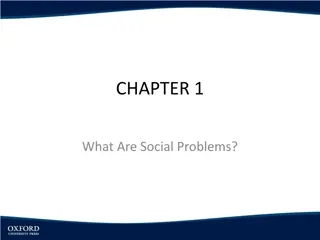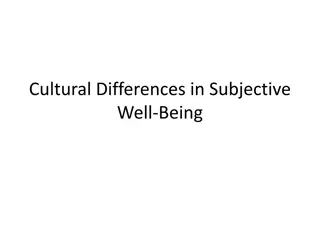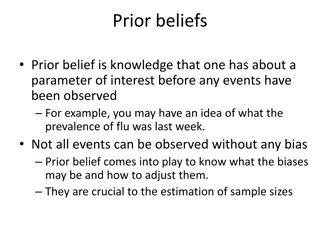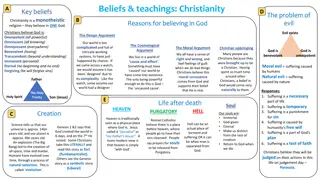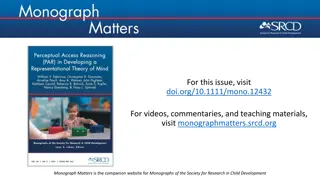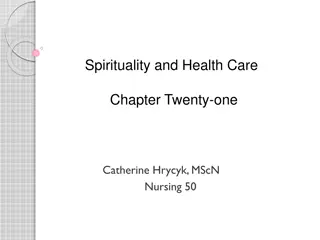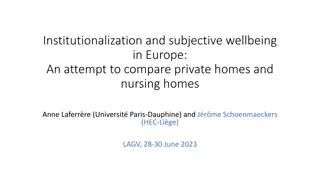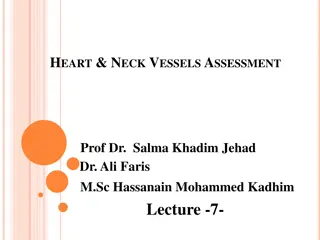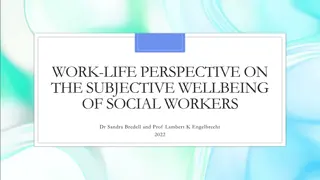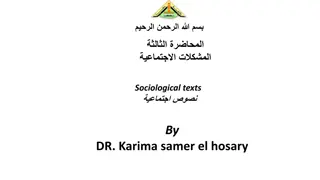Documentation Strategies for Patient Progress in SOAP Notes
Common format for SOAP Notes documentation includes Subjective, Objective, Assessment, and Plan sections. Subjective notes involve patient information and history, while Objective notes detail examination findings. Effective documentation strategies include organization, use of active verbs, and dir
2 views • 33 slides
Understanding Relativism and its Impact on Critical Thinking
Relativism poses a challenge to critical thinking by asserting that truth is subjective and varies from person to person or society to society. While some forms of relativism, like relativity, can be rational, global relativism faces self-referential inconsistency. Values relativism is commonly appl
0 views • 25 slides
Understanding Facts and Opinions in Reading Comprehension
Reading comprehension involves distinguishing between facts and opinions in a text. Facts can be objectively proven, while opinions are subjective reflections of personal feelings. Recognizing the difference is crucial for essay writing and critical analysis. By examining cues and asking specific qu
2 views • 9 slides
Symbols and Beliefs of the Salvation Army: A Visual Guide
Explore the core beliefs and symbolic representations of the Salvation Army through images and explanations. From the significance of the cross to the meaning behind the sword and shield symbols, discover how members of the Salvation Army express their faith and mission through various visual elemen
0 views • 17 slides
Understanding Social Problems: A Sociological Perspective
Social problems are conditions or behaviors that cause public concern and require collective action. Sociology, particularly in the study of social issues, aims to identify both objective elements like measurable harm and subjective elements like moral evaluations. These subjective beliefs can shape
0 views • 34 slides
Understanding Jewish Spiritual Care: Beliefs and Practices
Judaism's spiritual care is rooted in core beliefs such as the existence of God, the Torah, and key tenets of faith. Important aspects include the Jewish calendar, the role of the rabbi in religious guidance and pastoral counseling, and diverse views on the afterlife. Providing spiritual care to Jew
1 views • 12 slides
Understanding the Importance of Positive Psychology and Subjective Well-Being
Positive psychology emphasizes the significance of happiness, satisfaction, and well-being in people's lives. Subjective well-being (SWB) focuses on individuals' evaluations and feelings about their lives rather than just objective conditions. Enhancing SWB is not only about feeling better but also
1 views • 48 slides
Cultural Contrasts in Subjective Well-Being: Factors and Values
Societies exhibit varying levels of well-being influenced by factors such as wealth, stability, and culture. Economic development, social stability, and individualist-collectivist values play crucial roles. Broad socioeconomic indicators like GDP and life expectancy impact well-being significantly.
1 views • 49 slides
Understanding Values, Beliefs, and Personal Values in Everyday Life
Our values and beliefs shape how we think, act, and make decisions in everyday life. Whether conscious or not, they influence our behavior and attitudes. This article explores the definitions and importance of beliefs, values, and personal values, highlighting how they impact individual decision-mak
1 views • 27 slides
Understanding the Shirbit Culture: Beliefs and Rituals
The Shirbit culture holds unique beliefs about the human body, engaging in elaborate rituals to counter its perceived weaknesses and maintain social well-being. This culture's practices include secretive ceremonies, reverence for a charm box, and self-mutilation rituals for both men and women, all b
1 views • 9 slides
Cultivating Beliefs: The Garden of Our Minds
In the garden of our minds, our beliefs are the seeds we plant and nurture. Just as we each have our unique soil, we develop beliefs about ourselves, others, and the world. We make decisions based on the strokes we receive from our environment, shaping our script. Reflect on the positive and negativ
1 views • 20 slides
Exploring Islam Beliefs in the KS4 Curriculum: Big Ideas and Key Concepts
Delve into the fundamental beliefs of Islam according to the AQA A curriculum, focusing on the authority of Prophethood, key beliefs like Tawhid (Oneness of God), nature of God, angels, predestination, and the afterlife. Explore the significance of holy books like the Qur'an, Torah, Psalms, and Gosp
0 views • 10 slides
Understanding Prior Beliefs and Eliciting Expert Opinions in Parameter Estimation
Prior beliefs play a crucial role in estimating parameters of interest before observing events. They can be elicited from sources like meta-analyses, literature, and expert opinions. Experts' beliefs are often measured using Beta or Normal distributions for different outcomes. Eliciting prior belief
1 views • 22 slides
Exploration of Islamic Beliefs in the RE KS4 Curriculum
This educational project delves into key concepts of Islam, focusing on beliefs about God as found in the Quran. Through interactive lessons and activities, students explore the significance of Eid ul-Adha, Ibrahim's submission to God, and the roots of Islamic monotheism. The curriculum aims to deep
0 views • 10 slides
The Origins of Beliefs: A Comparative Analysis of Tarde and Durkheim
Gabriel Tarde and Emile Durkheim engaged in philosophical debates on the origins of beliefs within societal structures. While Durkheim saw beliefs as integral to society's moral ideals, Tarde proposed a neo-monadological theory focusing on actors' beliefs within social practices. The discourse quest
2 views • 19 slides
Christianity: Key Beliefs, Teachings, and Jesus' Sacrifice
Christianity is a monotheistic religion centered on beliefs in God's omnipotence, benevolence, and the existence of evil. Christians attribute their moral conscience and sense of right and wrong to God. The faith also incorporates teachings about Jesus' suffering and crucifixion, emphasizing forgive
3 views • 9 slides
Exploring Christianity: Beliefs and Key Concepts at KS4
This project delves into the foundational beliefs of Christianity, focusing on key concepts such as the nature of God, the Trinity, Jesus Christ, salvation, the afterlife, and the problem of evil. The curriculum covers diverse interpretations within Christianity, ethical dimensions, philosophical in
0 views • 4 slides
Understanding Suicide Beliefs and Peer-to-Peer Support Groups
Explore beliefs about suicide and the impact on open discussions. Learn about Alternatives to Suicide peer-to-peer groups and the values and framework they uphold for mutual support. Emphasizing empathy, respect, and non-coercive approaches, these groups provide a safe space for individuals to share
3 views • 20 slides
Comparison of Beliefs in Sunni and Shia Islam regarding Allah, Prophets, and the Last Day
Sunni and Shia Islam have core beliefs focusing on Allah, prophethood, and the afterlife. While Sunni Muslims emphasize Tawhid and the last day judgment, Shia Muslims also emphasize the belief in the Imams as successors of Prophet Muhammad. Both sects share common beliefs in Allah's attributes and t
4 views • 12 slides
Exploring Socio-Cultural Beliefs Impact on Community Health Insurance in Nigeria
In Nigeria, the demand for Community Based Social Health Insurance Programs (CBSHIP) is influenced by socio-cultural beliefs. This case study conducted in Ondo Residents delves into the challenges and opportunities faced in ensuring universal health coverage, particularly in rural areas. By examinin
0 views • 13 slides
Understanding Theory of Mind Development in Children
Explore the role of Perceptual Access Reasoning (PAR) in theory of mind development through topics like false-belief tasks, reasoning about desires and beliefs, and understanding false beliefs in young children. Learn how children perceive unseen mental states and predict behaviors based on beliefs
0 views • 27 slides
Group Decision-Making: The Wisdom of Crowds and Stupidity of Herds
This presentation by Richard Zeckhauser of Harvard University delves into the importance of rational analysis and subjective probability in group decision-making processes. It emphasizes the need to focus on collective wisdom while avoiding biases that can affect group decisions. Key concepts covere
2 views • 22 slides
Understanding Spirituality and Health Care in Nursing Practice
Exploring the concepts of spirituality, religious versus secular perspectives, spiritual distress, and the role of nurses in providing spiritual support during times of transition and vulnerability. Spirituality is defined as a sense of meaning in life and inner spirit, central to creating beliefs a
0 views • 11 slides
Understanding Political Beliefs and Behaviors: A Comprehensive Overview
Explore the formation, evolution, and transmission of political beliefs, as well as the impact of differing beliefs and behaviors on the political process. Delve into platform issues, political affiliations, and their influences to gain a deeper understanding of the political landscape.
1 views • 53 slides
Understanding Nationalism in Political Science
Nationalism, a complex concept, defines the nation as the fundamental unit of political rule. It encompasses a mix of objective and subjective factors, including cultural, ethnic, and political traits. The definition of a nation is subjective, based on how its members perceive themselves as a distin
0 views • 27 slides
Understanding the Power of Beliefs and Thoughts
Explore the profound impact of beliefs and thoughts on our internal world, behaviors, and emotions. Uncover how our inner dialogue shapes our perception and influences our beliefs about ourselves, others, and life. Delve into the significance of renewing the mind to foster a healthier belief system
0 views • 94 slides
Ghost Beliefs and Perceptions Survey Analysis
A survey conducted on ghost beliefs and perceptions explored various aspects such as gender, college majors, region, religiosity, ghostly encounters, belief in supernatural entities, enjoyment of ghost-themed shows, and the willingness to seek out ghosts. The analysis revealed diverse perspectives a
1 views • 15 slides
Explore Superstitions and Beliefs Across Cultures
Delve into the intriguing world of superstitions with a diverse collection from various cultures, including British and Russian traditions. Discover beliefs about luck, symbols like black cats and four-leaf clovers, and common superstitions such as avoiding walking under ladders or spilling salt. Un
0 views • 10 slides
Effectiveness of Psychological Intervention in Managing Stress and Depression Among Cancer Patients
A study was conducted to assess the effectiveness of a psychological intervention program in managing stress, depression, and subjective well-being among cancer patients. The study involved 132 cancer patients aged 35 to 65 years, with 72 patients in the experimental group receiving psychological in
2 views • 48 slides
QBism and Convivial Solipsism in Quantum Interpretations
QBism and Convivial Solipsism present different interpretations of quantum mechanics, focusing on the subjective nature of probabilities and experiences within the quantum formalism. QBism emphasizes the subjective interpretation of probability, considering the quantum state as a tool for assigning
0 views • 30 slides
Exploring EFL Teachers' Subjective Theories on Pronunciation Training
This study delves into EFL teachers' subjective theories regarding pronunciation training, with a focus on Internet-supported practices. Through semi-structured interviews, 11 high school EFL teachers shared their views and attitudes on the importance of pronunciation training in EFL classrooms, as
1 views • 13 slides
Comprehensive Guide to Abdominal Assessment for Healthcare Professionals
This lecture by Hassanain Mohammed Kadhim covers the essential techniques and subjective data needed for a thorough abdominal assessment. It includes objectives, equipment required, preparation steps, subjective data collection, inspection guidelines, abdominal landmarks, common causes of abdominal
0 views • 21 slides
Comparative Analysis of Institutionalization and Subjective Wellbeing in Europe
This study explores the impact of institutionalization on subjective wellbeing in Europe, comparing private homes and nursing homes. The research examines the desire to avoid nursing homes, especially heightened by the COVID-19 pandemic, and investigates the wellbeing of older Europeans in different
0 views • 14 slides
Causal Effects of Health on Retirement Using Subjective Conditional Expectations
This research explores the impact of health on retirement decisions by analyzing subjective conditional expectations of older workers. By studying the relationship between health, work, and retirement planning, the study aims to provide insights into policy implications for ensuring the future solve
0 views • 19 slides
Understanding Key Concepts of Insurance
Key notions of insurance include fortuitous loss, risk occurrence, loss exposure, objective and subjective risk, and the law of large numbers to predict future loss experience. Objective risk is based on actual loss variation, while subjective risk is based on individual perception. Understanding th
0 views • 26 slides
Pre-Service Teachers' Beliefs and Reception of Educational Research
Exploring the awareness and trust of pre-service teachers in educational psychology misconceptions, epistemic trust in educational scientists, questioning prior beliefs when faced with evidence, and beliefs about the instrumental quality of information sources for teaching. The symposium delves into
0 views • 10 slides
Heart and Neck Vessels Assessment Overview
This information presents a comprehensive guide for heart and neck vessels assessment, including objectives, necessary equipment, preparation steps, subjective data to consider, techniques for palpating and auscultating the carotid artery, normal findings, and more. It emphasizes the importance of s
0 views • 23 slides
Cognitive Study of Subjectivity Extraction in Sentiment Annotation
A cognitive study on extracting subjectivity in sentiment annotation, exploring if humans perform subjective extraction similarly to machines for sentiment analysis. The study investigates sentiment oscillations and different methods adopted based on the nature of subjective documents.
0 views • 14 slides
Understanding Subjective Wellbeing of Social Workers in South Africa
Gain insights into the subjective wellbeing of social workers in South Africa within the context of work-life balance. Explore perceptions of work-life balance and subjective wellbeing, aiming to provide recommendations for improving the overall wellbeing of social workers. The study uses theoretica
0 views • 24 slides
Evolution of Sociological Perspectives on Social Problems
The study of social problems has evolved dramatically since the 1970s, shifting from an objectivist approach to a more subjective and constructionist perspective. This shift acknowledges that what is considered a social problem is a matter of definition, and focuses on the social processes involved
0 views • 12 slides




